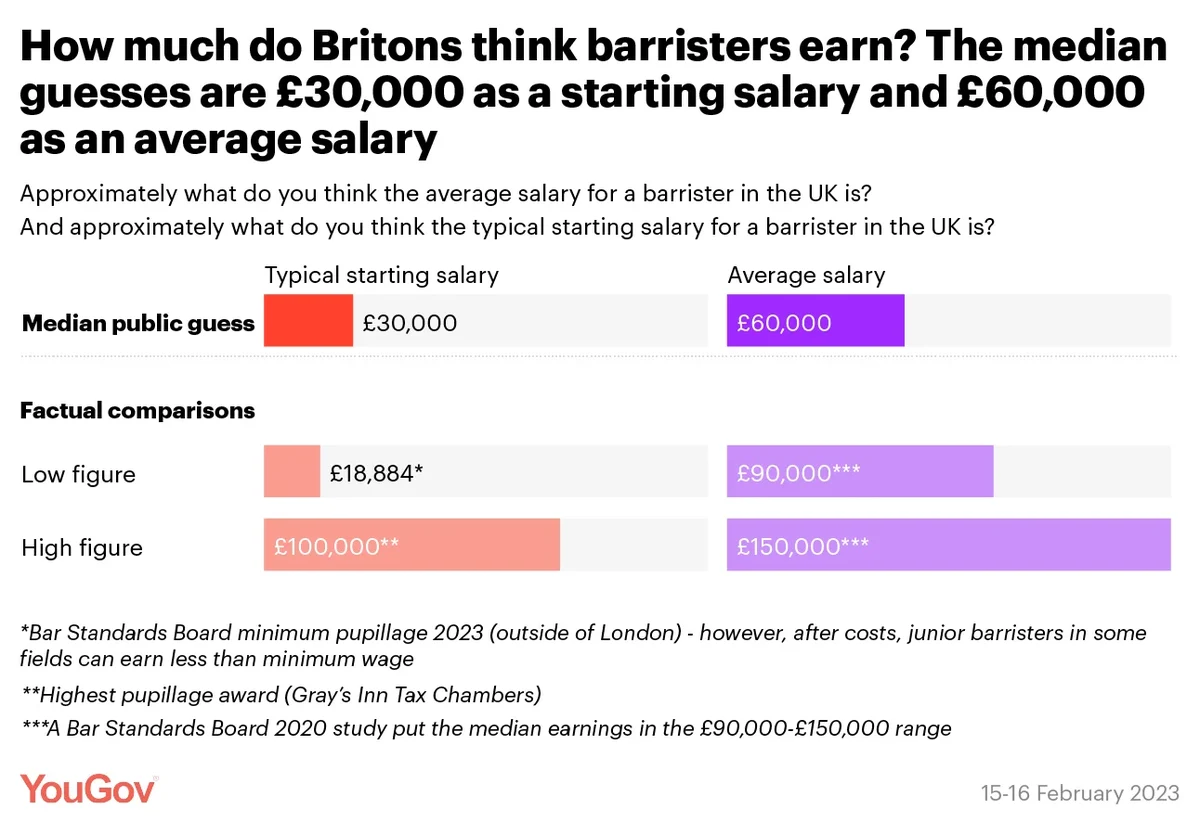Four in ten people believe members of the bar are overpaid
This winter, strikes across several key professions dominated the news agenda in the UK – but some won more support than others.
Out of ten professions that have taken industrial action in recent months – or are set to do so imminently – barristers are at the bottom of the pile when it comes to attracting public support for industrial action.
The most recent criminal barrister strikes were launched in a dispute over pay and cuts to legal aid. They were called off in October when the Criminal Bar Association accepted a deal from the government.
At 55% to 30%, Britons are nearly twice as likely to oppose strikes by members of the bar as they are to back them.
In contrast, 63% of the public support the historic nursing strikes – twice as many as the 31% who oppose them.
Four in ten Britons say barristers are overpaid, while just 2% believe ambulance staff are
As YouGov previously reported, there is a correlation between how underpaid a profession is seen to be and how supported its members are during strikes.
Nurses, for example, are most supported and also viewed as most underpaid, with 75% of the public saying so.
Barristers, however, are the most likely to be deemed by Britons as the most overpaid members of the ten professions, with train drivers thought of similarly.
Around four in ten people believe barristers (40%) and train drivers (37%) are overpaid compared to between 2% and 27% of other striking professionals.
While barristers are most likely to be seen as overpaid by “a lot” (23%), the reality can be very different.
When asked what they think the average pay for a barrister is, the public’s median guess is £60,000 a year, while the starting salary estimate is £30,000.
In fact, according to legal publication The Lawyer, barristers in some fields will make less than £20,000 a year at the start of their careers, with figures from a 2020 Bar Standards Board study showing that 12% of barristers were earning less than the public’s starting salary estimate of £30,000 a year.

However, figures from the same study show that the median barrister salary sits somewhere between £90,000 and £150,000 a year – substantially higher than the median public guess.
While most Britons say barristers make a great or fair contribution to society, they come behind almost all other professions asked about
There is also strong correlation between how well supported strikes are and how much the industries involved are seen to contribute to British society.
NHS workers are most likely to be seen as contributing a “great deal” or “fair amount”, with 92% of Britons saying so about nurses, 90% about ambulance staff and 89% about junior doctors.
In contrast, barristers (59%) are second only to civil servants (57%) in being least likely.
Barrister strikes are least likely to cause disruption for the average Briton
Industrial action from barristers may not be well supported in the eyes of the public, but just 8% of Britons say they’ve experienced disruption as a result.
More than eight in ten people say the strikes were either not very (12%) or not at all (71%) disruptive for them.
This supports YouGov’s previous assertation that there is no evidence of correlation between public support and strike-related disruption.
Strikes by postal workers are seen as most disruptive on a personal level, with 36% of the public experiencing disruption as a result.
And train strikes have also been significantly disruptive, with a third of Britons (32%) affected personally by railway worker walkouts and the same proportion (32%) by train drivers’ industrial action.
Picture: Getty








